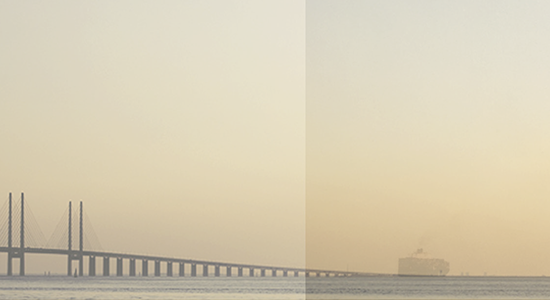Öresund Comparative Borderlands Research Group
The research group is a platform for collaboration based on active dialogue over the ways that bordering in a relatively affluent part of Europe intersects with realities taking place across an increasingly globalized world.

Doing so, it seeks to pluralize the diversity of actors typically understood to perform border work across EU regions; to consider novel methods to interpret contemporary border hybridity, porosity, and dependency alongside more established demarcations of geopolitical frontiers; and finally, to challenge the presumed legitimacy and utility of discourses and practices that naturalize bordering efforts and their effects.
This research group provides a space for researchers, artists and practitioners in the Öresund to work together to advance wider knowledge about the conditions and experiences of European bordering and borderlands. We take a particular interest in the ways that bordering occurs across diverse social, cultural, historical and geographical outlooks. Embracing an assertively interdisciplinary and comparative approach to critical border studies, the group seeks to generate conceptual frameworks and methodologies that strengthen awareness, understanding and action over the ways borders are constituted, inhabited and politicized within, beyond and in connection with the Öresund itself.
Cross-border integration is a pillar of the EU that views cohesion as the basis for societal well-being. With the creation of the Nordic Council in 1952, Nordic states have been hailed as pioneers of European region-building over numerous socio-economic, legal and environmental issues. The opening of the Öresund Bridge in 2000 exemplified long-held aspirations for a European community founded on the free movement of people and capital. Yet, this ‘golden age’ of European integration is today increasingly under threat. Since 2015, researchers and media in the Öresund have highlighted the increasing normalization of resentment towards refugees and migrants in mainstream political discourse, the persistence of border closures and mobility restrictions on each side of the Sound, and growing inequities in socio-economic power and opportunity available to residents in terms of education, transportation, housing, and other amenities. These challenges are focal points for the field of critical border studies, and as circumstances evolve, the need to account for the ways that borders are established in, related to, and made meaningful for different groups are as urgent as ever.
- Providing hands-on knowledge exchange opportunities for people, within and outside academia, to explore new ways to depict, account for, and respond to European bordering processes and extended borderlands;
- Supporting educational activities and professional development opportunities for students and researchers interested in European borders and borderlands;
- Connecting research group efforts into ongoing activities of other EU research clusters focused on European borders and borderlands (seminars, workshops, etc.);
- Cultivating, through the expertise of its members, a collective voice in public debates around societal questions pertaining to borders, migration, inclusion and regional integration in the Öresund.
- Exploring methodological and artistic practices that might be used to advance theoretical understandings of the multiple, complex expressions of European bordering;
For questions regarding activities, to sign up to the mailing list or information about membership, contact the group's coordinators.
Talks/Workshops
Dwelling, elsewhere borderland webinar series
- 17 October (14.00 CEST)
The borderless wild boar - Excursions as field method
Presenters: Carl Johan Erikson & Karin Willén (visual artists)
Discussants: Lisa Babette Diedrich (SLU) & Gini Lee (University of Melbourne) - 14 November (13.00 CET)
Introducing the mud to the sublime - Post-humanist methods for critical border studies
Presenter: Mathilda Rosengren (Malmö University)
Discussant: Umut Ozguc (Macquarie University) - 6 December (14.00 CET)
Precarious encampments in hostile border zones - Methods of inhabitation
Presenter: Maria Hagan (University of Cambridge)
Discussant: Jennifer Mack (KTH, Swedish Collegium for Advanced Study)
-
Johanna Rivano Eckerdal, Head of Centre for Oresund Region Studies, Lund university
-
Mia Krokstäde, Coordinator, Lund University
-
William Kutz, Affiliated researcher, Lund University
Researchers
| Name | Title | Phone | |
|---|---|---|---|
| Bissenbakker, Mons | Associate Professor | +4535335923 | |
| Kapitsinis, Nikos | Assistant Professor - Tenure Track | +4535335094 | |
| Poulia, Sofia | PhD Fellow | +4535325337 | |
| Sandberg, Marie | Associate Professor - Promotion Programme | +4551299017 |
| Agnidakis, Paul | Senior Lecturer, Lund University |
| Axelsson, Linn | Professor, Stockholm University |
| Cory, Erin | Senior Lecturer, Malmö University |
| Denarnaud, Eugénie | Researcher, Ecole nationale supérieure de paysage |
| Halldenius, Lena | Professor, Lund University |
| Keshavarz, Mahmoud | Associate Senior Lecturer, Uppsala University |
| Kutz, William | Researcher, Lund University |
| Pugh, Rhiannon | Senior Lecturer, Lund University |
| Ristilammi, Per-Markku |
Senior Lecturer, Malmö University |
| Rivano Eckerdal, Johanna |
Associate Professor, Lund University |
| Rosengren, Mathilda | Postdoc, Malmö University |
| Sager, Maja | Associate Professor, Lund University |
| Sanders, Hanne | Professor, Lund University |
| Sohn, Christophe |
Senior Researcher, LISER |
| Turan, Burcu Yigit | Senior Lecturer, Landscape Architecture, SLU |
| Öberg, Marja-Liisa | Associate Professor, Lund University |
Past events
-
11 Dec. 2025, 13:00-14:00
Working with local communities: Challenges and opportunities
-
20 Nov. 2025, 13:00-14:00
Human-Nature Encounters in Urban Space
-
23 Oct. 2025, 13:00-14:00
Transpieces & entanglement - The beautiful mess of inhabiting borders
-
18 Sept. 2025, 13:00-14:00
Mattering presence: Thinking about the other things that happen when we are present with unknown others
-
22 May 2025, 13:00-14:00
Inscribing Belonging - Creative Methods for Listening to Migration
-
24 Apr. 2025, 13:00-14:00
Walking the lines - Reflections on walking methods in Jordan
